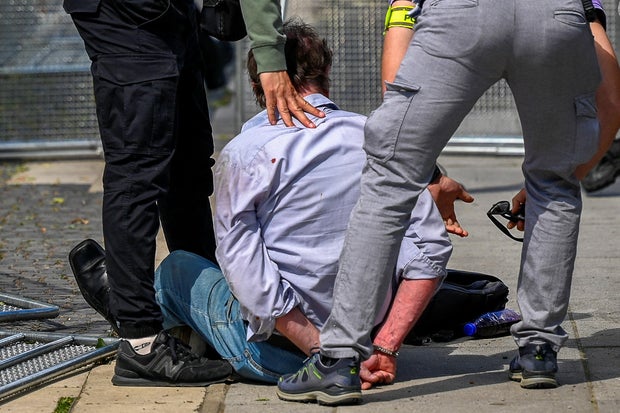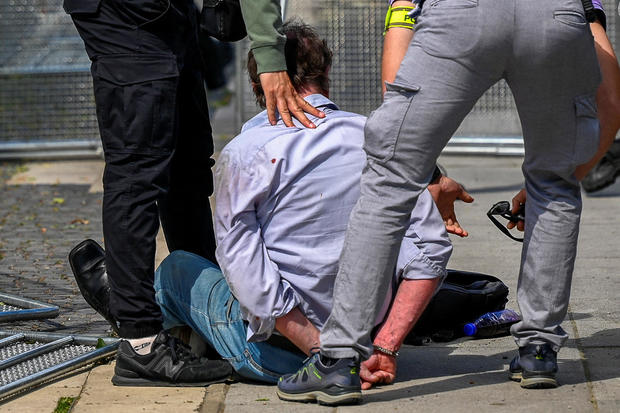The prime minister of Slovakia remains in serious condition after he was attacked and shot multiple times earlier this week, officials said Saturday.
Health Minister Zuzana Dolinkova said Prime Minister Robert Fico had undergone two hours of surgery on Friday to remove dead tissue from multiple gunshot wounds that “contributed to a positive prognosis.” Dolinkova was speaking outside the University F.D. Roosevelt Hospital in Banska Bystrica, where Fico was taken by helicopter after the shooting.
“Several miracles have occurred in Banska Bystrica in recent days coming from the hands of doctors, nurses and the personnel at the Roosevelt Hospital,” Defense Minister Robert Kalinak said.
Fico, 59, was attacked as he greeted supporters following a government meeting Wednesday in the former coal mining town of Handlova, nearly 85 miles northeast of the capital. At least four shots were fired outside a cultural center and the suspect was tackled to the ground and arrested.
Video from the scene showed security personnel rushing the wounded premier into a car before driving away at speed. He was transferred to a helicopter and cameras then captured him being rolled on a stretcher, covered by blankets, into the hospital.

Radovan Stoklasa/REUTERS
Fico’s condition is still too grave to transport him to the capital, Bratislava, Kalinak said.
The update on Fico’s health came at the same time the man accused of attempting to assassinate him made his first court appearance, according to Slovak state media.
Prosecutors were seeking an order from Slovakia’s Specialized Criminal Court to detain the suspect.
Prosecutors told police not to publicly identify the man or release other details about the case, but unconfirmed media reports said he was a 71-year-old retiree known as an amateur poet who may have once worked as a mall security guard in the country’s southwest.
The attempted assassination shocked the small central European nation, with many blaming the attack in part on extreme political polarization that has divided the country.
Interior Minister Matus Sutaj Estok said Wednesday that an initial investigation found “a clear political motivation” behind the attack on Fico while he was attending a government meeting in a former coal mining town. However, he said Thursday that the suspect charged was a lone wolf who “did not belong to any political groups.”
The courthouse in Pezinok, a small town outside the capital, Bratislava, was guarded by officers wearing balaclavas and carrying rifles. News media were not allowed in and reporters were kept behind a gate outside.
Police on Friday had taken the suspect to his home in the town of Levice and seized a computer and some documents, Markiza, a Slovak television station reported. The police didn’t comment.
World leaders have condemned the attack and offered support for Fico and Slovakia.
Fico has long been a divisive figure in Slovakia and beyond. His return to power last year on a pro-Russia, anti-American platform led to worries among fellow European Union and NATO members that he would abandon his country’s pro-Western course, particularly on Ukraine.
At the start of Russia’s full-scale invasion in February 2022, Slovakia was one of Ukraine’s staunchest supporters, but Fico halted arms deliveries to Ukraine when he returned to power, his fourth time serving as prime minister.
Fico’s government has also made efforts to overhaul public broadcasting — a move critics said would give the government full control of public television and radio. That, coupled with his plans to amend the penal code to eliminate a special anti-graft prosecutor, have led opponents to worry that Fico will lead Slovakia down a more autocratic path.
Thousands of demonstrators have repeatedly rallied in the capital and around the country of 5.4 million to protest his policies.
Fico said last month on Facebook that he believed rising tensions in the country could lead to the killing of politicians, and he blamed the media for fueling tensions.
Before Fico returned to power last year, many of his political and business associates were the focus of police investigations, and dozens have been charged.
His plan to overhaul the penal system would eliminate the office of the special prosecutor that deals with organized crime, corruption and extremism.
- In:
- Slovakia
